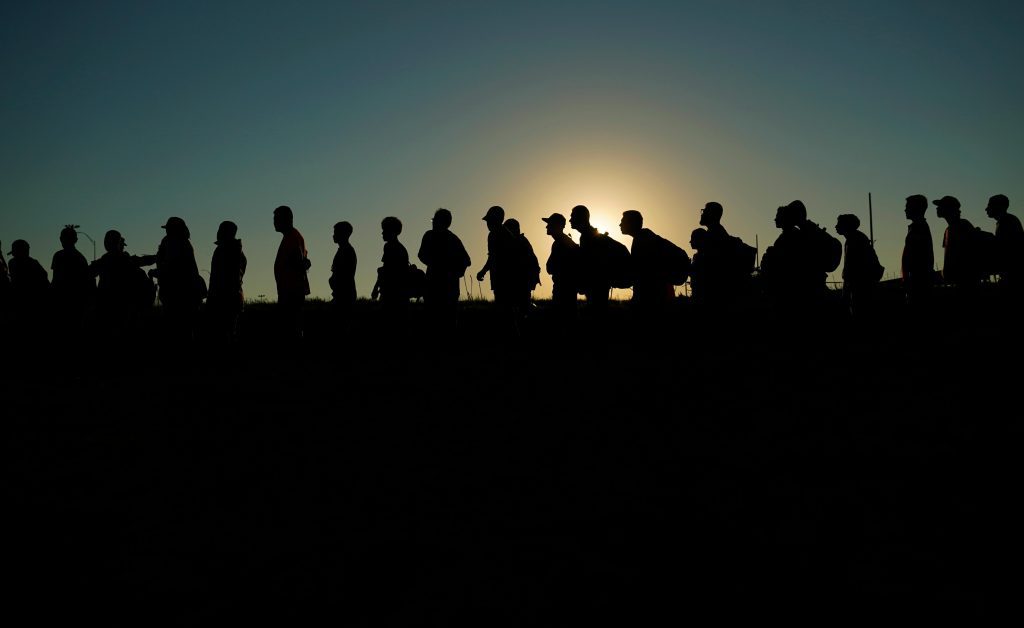By VALERIE GONZALEZ (Associated Press)
In McALLEN, Texas, plans to arrest migrants suspected of illegally entering the U.S. were put on hold again on Wednesday. This caused uncertainty at the border and angered Mexico during the brief period when the law was in effect.
On Tuesday night, a panel from the 5th U.S. Circuit Court of Appeals issued an order to stop Texas' expansion of border enforcement, which had been approved by the U.S. Supreme Court earlier that day, giving a win to Republican Gov. Greg Abbott. However, a 2-1 order from the appeals court later paused the law again before oral arguments scheduled for Wednesday.
The legal back-and-forth surrounding the Texas law continued when the appeals court panel put it on hold again. It was unclear when the next decision might be made.
While the law was briefly in effect on Tuesday, Texas authorities did not announce any arrests or confirm if it was being actively enforced. Sheriff Brad Coe in Kinney County expressed support for the arrest powers but said deputies would need probable cause.
Sheriff Coe stated that there would unlikely be an immediate change, as his county's border area near Del Rio, which previously had high illegal crossings, has become much quieter.
The Supreme Court did not rule on the merits of the law, instead returning the challenge by the Justice Department to the lower appeals court. The department argued that Texas is overstepping the federal government’s authority.
The latest appeals court order, which did not include an explanation, had the effect of reinstating an injunction issued in February by U.S. District Judge David Ezra. He criticized the law on multiple fronts, dismissing Republicans’ claims of an “invasion” at the southern border due to record-high illegal crossings. Ezra, an appointee of former President Ronald Reagan, also cautioned that the law could affect U.S. foreign relations.
According to the Texas law, defendants in custody for illegal entry charges can choose to leave the U.S. under a judge’s order, or face prosecution. On Tuesday, Mexico’s Foreign Affairs Secretary stated that it would not accept anyone ordered to return across the border.
The Mexican government reiterated its right to protect its nationals in the U.S. and determine its own entry policies.
The law's impact extends beyond the Texas border, as it applies to all 254 counties in the state. However, the director of the Texas Department of Public Safety anticipates that it will mainly be enforced near the border.
Other Republican-led states are considering following Texas’ lead. In Iowa, the state House passed a bill on Tuesday allowing state law enforcement to arrest people who are in the U.S. illegally and have previously been denied entry.
The bill now goes to Republican Governor Kim Reynolds. If she signs it, it will become effective in July.
Republican Iowa state Rep. Steven Holt stated that the federal government has given up its duties and states should take action.
El Paso County Judge Ricardo Samaniego in Texas said that immigration enforcement should remain a federal responsibility, not a state one, echoing the Biden administration's view. He mentioned that increased law enforcement presence in El Paso during a previous surge in migrants led to high-speed chases and traffic stops based on assumptions of passengers being in the country illegally.
Samaniego mentioned the accidents and injuries that occurred during the previous surge, giving a glimpse of what could happen if the state takes control of immigration matters.
Skylor Hearn, executive director of the Sheriffs' Association of Texas, mentioned that sheriffs' offices have been training since last year.
Hearn mentioned that if a county chooses to take on immigration enforcement, it means the taxpayers of that county will also bear the responsibility. He emphasized that as long as the federal government fulfills its responsibilities, they should be the ones handling these matters.
Daniel Morales, an associate professor of law at the University of Houston Law Center, commented that the Texas law will be very difficult to enforce.
Morales stated that Governor Greg Abbott seems to want to enforce the law for publicity, but it will require a lot of state resources to implement. He also questioned the state government's willingness and capacity to take on this task.
The number of arrests for illegal border crossings dropped by half in January from the record high of 250,000 in December, with significant declines in Texas. In the Border Patrol's Del Rio sector, the focus of Abbott's enforcement, arrests fell by 76% from December. The Rio Grande Valley, which has been the busiest corridor for illegal crossings for much of the past decade, recorded its lowest number of arrests since June 2020.
Tucson, Arizona, has been the busiest corridor in recent months, followed by San Diego in January, but the reasons for sudden shifts are often complex and are influenced by smuggling organizations.
When President Joe Biden visited the Rio Grande Valley for his second trip to the border as president last month, administration officials attributed the drop in arrests to Mexico's increased enforcement on that part of the border. They mentioned that conditions were more challenging for Mexican law enforcement in Sonora, the state south of Arizona.
___
Associated Press writers Acacia Coronado in Austin, Texas; Juan A. Lozano in Houston; Christopher Sherman in Mexico City; and Scott McFetridge in Des Moines, Iowa contributed to this report.









